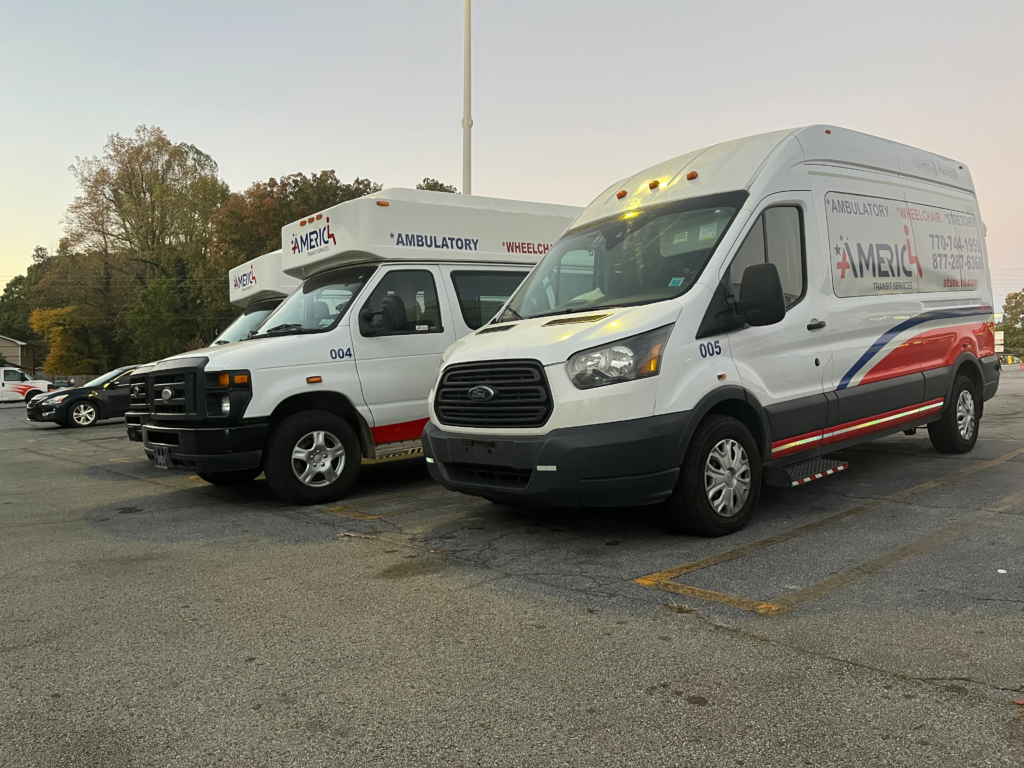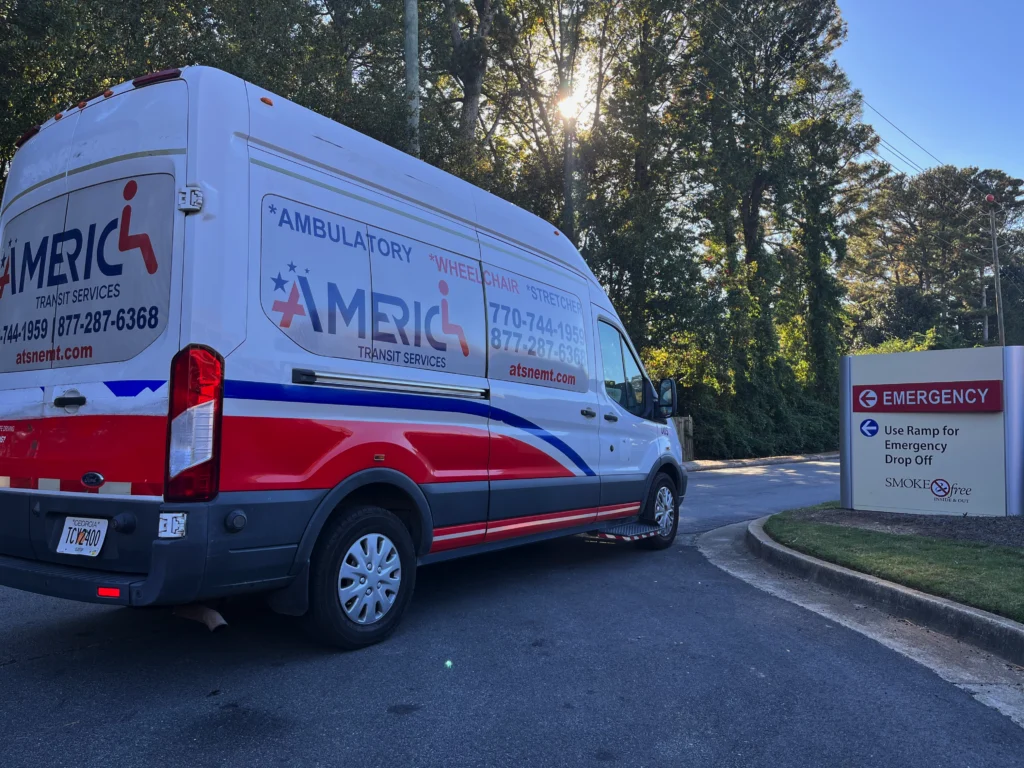How Ambulatory Services are Changing Lives

2023 is not the realm of science fiction anymore; it’s our reality. We have self-driving cars, AI assistants that know us better than we know ourselves, and space tourism looks set to become a bustling industry in a couple of years. Yet, amidst these impressive advancements, millions still struggle with simple mobility – getting from point A to B without hassle or discomfort. However, the tide is turning. The emergence of Non-Emergency Medical Transportation (NEMT) services has heralded a new age for accessibility and independence for those who need it most. Now, more than ever, ambulatory services are redefining what mobility means and changing lives forever. This revolution is unfolding right under our noses – let’s understand how.
Does the average person give much thought to this simple yet powerful act of moving? Let’s delve into this world where wheels do much more than just roll; they make dreams come true.
Ambulatory transportation services cater to individuals who are able to walk or move with minimal assistance but may not be able to travel by traditional means of transportation. These services use specially-equipped vehicles and trained personnel to provide safe and secure transportation for patients traveling to medical appointments, social events or anywhere their daily lives take them. By offering a safe and convenient option for individuals with mobility challenges, ambulatory transportation services help redefine mobility for those who may be otherwise limited in their ability to travel.
Understanding Ambulatory Services
For many people, mobility is something that is taken for granted until you lose it through injury, disease or aging. This can make simple tasks like walking to the grocery store or going to work difficult or even impossible. That is where ambulatory services come in – they are designed to help people who require assistance with mobility and make it possible for them to maintain their independence and dignity.
Imagine breaking your leg and needing to get around for several weeks without being able to bear weight on your injured limb. You might be unable to drive, navigate stairs or travel long distances. In this situation, ambulance services would not be necessary but you would still need help getting around, which is where ambulatory services come in.
These services cater to individuals who require non-emergency medical transportation, such as those recovering from surgery, those who have disabilities, seniors, and anyone who needs assistance with daily activities such as shopping or visiting the doctor.
Ambulatory services also provide a more cost-effective solution compared to emergency medical transportation services. They reduce the burden on emergency rooms by providing non-emergency transport services, allowing emergency personnel to focus on saving lives while ensuring that patients receive safe and secure transportation services.
Another key advantage of ambulatory services is that they offer greater flexibility when making appointments. Unlike traditional medical transport options which require advanced booking, ambulatory services offer quicker turnaround times with on-demand availability. This means that an individual can receive door-to-door service with timed waits instead of sitting in a waiting room for hours.
Some critics argue that ambulatory services may lack specialized medical staff needed for certain patient populations, focusing only on transportation instead of holistic care. However, while some may not provide supplementary medical care beyond transportation support, other cities and regions employ paramedics or other trained personnel as part of their basic response team.
One way of qualifying the kind of service you need is by considering your current mobility needs and limitations. Some people may prefer non-medical transport to routine appointments like physiotherapy or dental procedures, whereas others with chronic illnesses may require more intensive support.

Different Kinds of Ambulatory Services
Broadly speaking, there are different kinds of ambulatory services that cater to individuals with different needs and requirements. Here are some examples:
1. Ambulance or medical transport services – These are for individuals who require specialized transportation involving medical equipment or trained professionals due to their injuries or illness.
2. Wheelchair transportation – For those unable to walk because of injury, chronic illness, or disability, this form of ambulatory transportation offers a secure way to move that is safe and comfortable.
3. Passenger vans – This covers more general population groups who require transportation without medical assistance as well as the elderly who require socialization opportunities.
4. Stretcher transportation – This type of service provides patients with medical conditions that require constant monitoring an ambulance-like vehicle, equipped with stretchers and other required equipment.
5. Non-medical emergency transportation – For non-emergency situations that still require prompt attention like family emergencies, unexpected doctor’s appointments where driving is not possible due to the driver’s medical condition.
Let’s say you have a family member with a broken leg staying at home and you need to take them to a doctor’s appointment but do not own a wheelchair accessible vehicle (WAV). Instead of struggling with taxis or public transit, you can opt for non-medical emergency transport service since your loved one does not require specialized medical care during transit.
Think of ambulatory transport services like they’re customized cab services tailored for your unique mobility needs. Whether you need to travel on a stretcher or simply a non-medicaid vehicle for an outing, ambulatory services make it easier for people to get from point A to B safely and comfortably.
However, it’s important to keep in mind that some ambulatory services may have restrictions or limitations. For instance, some may only operate within a specific region or city while others may restrict services based on individual needs.
Procedures Offered Via Ambulatory Services
Ambulatory services offer a wide range of medical procedures for patients who do not require inpatient admission and are usually performed on an outpatient basis. These procedures include diagnostic tests, minor surgeries, imaging services, and therapy sessions. The main advantage of ambulatory services is that they provide quick diagnosis, treatment, and recovery with minimal disruption to the patient’s daily routine.
One common diagnostic test offered through ambulatory services is endoscopy. This procedure uses a flexible tube with a camera at the end to examine a patient’s digestive system or respiratory tract. The test can diagnose conditions such as inflammation, ulcers, tumors, or blockages. Endoscopy is typically performed under local anesthesia and takes about 15 to 30 minutes. Patients can resume their regular diet and activities soon after the procedure.
Another example of an ambulatory service is cataract surgery. This procedure involves removing the natural lens of the eye and replacing it with an artificial lens to restore vision. Cataract surgery is usually done under local anesthesia and takes about 10 to 20 minutes per eye. Patients can go home on the same day and experience improved vision within a few days.
Think of ambulatory services as a fast food restaurant for medical care. Just like you can order a meal quickly and conveniently without reservations or wait times, you can get medical attention without the hassle of hospital admission, preoperative testing, or overnight stays. Instead, you receive the same quality treatment in a more efficient and cost-effective way.
Exploring the Benefits of Ambulatory Services
Ambulatory services offer several benefits compared to inpatient hospital care. For one, ambulatory services tend to be less expensive than hospitalization due to fewer resources required for treatment. Additionally, patients using ambulatory services have the flexibility to schedule procedures outside of traditional business hours.
Ambulatory services provide crucial benefits by offering convenient and flexible medical transportation for individuals who can walk or move without assistance. These services contribute to timely access to healthcare, facilitating medical appointments, treatments, and diagnostic procedures, ultimately improving overall health outcomes and patient satisfaction.
Another significant advantage of ambulatory services is accessibility. These facilities are often located in more community-based settings, making essential medical services available to remote or underserved areas. For instance, people with limited mobility or transportation options can receive appropriate medical care through a mobile clinic.
Another benefit of ambulatory services is personalized care. In many cases, these facilities offer the same level of care as a hospital but with individualized attention from doctors, nurses, and other healthcare professionals. Patients feel more comfortable and at ease during their treatments because they are receiving care in a more familiar and less intimidating environment.
Some people argue that ambulatory services trade quality for convenience, but this is a misconception. In fact, the standard of care provided by ambulatory services is comparable to that of inpatient hospitals. Patients receive thorough preoperative evaluation, anesthesia monitoring, post-operative follow-up plans, and clear instructions for home recovery.
Accessibility and Comprehensive Care
Accessibility and comprehensive care are the cornerstones of ambulatory services. For people who are unable to independently travel to medical appointments, rehab centers, or other social events, accessible transportation services, like Nemt transportation services, can be incredibly vital. These services provide safe and comfortable means of transport for those with disabilities, ensuring that they can access medical care when needed.
Comprehensive care goes beyond just transportation. Nemt transportation services offer a wide range of support options for clients with varying needs, including wheelchair-accessible vans, door-to-door assistance, non-emergency medical transportation, and more. The goal is to ensure clients receive the best possible service from start to finish while minimizing any discomfort or stress.
Even something as simple as worrying about finding a suitable parking spot can cause some people with mobility challenges to avoid appointments altogether. Nemt transportation services aims to remove this barrier by providing affordable and dependable transportation solutions that focus on comfort and convenience.
Accessible transportation is a critical aspect of healthcare in many communities around the world. Without these services, many people with disabilities or mobility challenges would be left without access to necessary medical care. On the other hand, accessibility includes not only transportation but facilities too such as sidewalks, curb cuts or ramps.
Despite the importance of accessibility and care within the healthcare industry, there’s still work to be done in terms of ensuring everyone can enjoy equal access to these services. For example, one of the biggest barriers for some people comes from age limits imposed by certain insurance policies on special needs patients.
Some critics argue that specialized vehicles should be prioritized so they can help patients navigate tricky terrain (e.g., hills, snow) and provide emergency aid if necessary rather than have them rely on taxis or ride-sharing apps.
In essence, accessibility is all about making sure everyone has the same opportunity for a healthy and fulfilling life, no matter what physical challenges they may have. It’s like building handicap ramps into buildings instead of just stairs, providing sign language interpreters at meetings or events, or other accommodations that make it possible for people with different needs to participate fully.
However, despite the numerous benefits that ambulatory services offer individuals with mobility challenges, there are still some challenges that must be addressed in order to ensure everyone has access to the care they need.
Addressing the Challenges in Ambulatory Services
The biggest concern is transportation methods such as taxis or ride-sharing apps may not always be reliable and accessible enough to meet the unique needs of people who require ambulatory services. Luckily, companies like Nemt transportation services and Go Muve Mobility Ecosystem offer alternative options that cater specifically to these needs.
For instance, dispatch operators from Nemt transportation services can inform both clients and caregivers about where a vehicle is at any given time while ongoing communication between drivers and clients ensures prompt arrival times. This is especially crucial in emergencies when patients urgently need specialized journeys.
Additionally, these unique solutions provide alternative transport methods for those needing non-emergency medical transportation (NEMT). NEMT provided by Medicare or Medicaid, as an example, often doesn’t provide all the coverage necessary competently. That’s why having corporations like Nemt transportation services can make all the difference as they directly address traditional insurance gaps.
Despite all of this, there are still plenty of hurdles that must be overcome if we want to see long-lasting change within the ambulatory services industry. For one thing, many traditional taxi companies and ride-sharing firms either do not accept customers with disabilities or do not equip their vehicles adequately. Even worse, many refuse to accommodate modified vehicles operated by people with disabilities.
Furthermore, shortages of healthcare workers, especially in rural areas, may result in long wait times for ambulatory services. Waiting for hours or even days for a ride can put a strain on individuals who require immediate medical attention.
Ultimately, the issue of accessibility and comprehensive care are crucial to the health and well-being of individuals across the spectrum. It’s like trying to navigate a perilous path without any direction or guidance. However, with innovative solutions like Nemt transportation services and Go Muve Mobility Ecosystem combined with systemic change led by policymakers and industry stakeholders alike, we can finally start to bridge the gap that has separated so many people from adequate healthcare services for too long.
As technology continues to evolve, so too will the ambulatory services sector. By addressing these challenges head-on and continuing to push for innovation and progressiveness, we can ensure that everyone in need of comprehensive care is able to receive it regardless of their specific needs.

Elevating Non-Emergency Medical Transportation and Ambulatory Services to Unmatched Levels of Excellence with Americ Transit Services
Are you seeking exceptional non-emergency medical transportation and ambulatory services that prioritize your comfort, safety, and well-being? Look no further than Americ Transit Services, the premier provider of top-notch transportation solutions!
Trust in Excellence: Americ Transit Services is committed to delivering excellence in non-emergency medical transportation and ambulatory services. Our dedicated team of professionals is highly trained, compassionate, and focused on ensuring your journey is safe, comfortable, and stress-free.
Comprehensive Non-Emergency Medical Transportation: Whether you need transportation to routine medical appointments, hospital discharges, rehabilitation sessions, or specialized treatments, Americ Transit Services has you covered. Our extensive fleet of well-maintained vehicles and experienced drivers will transport you promptly, reliably, and with the utmost care.
Ambulatory Services: Americ Transit Services goes beyond transportation by offering exceptional ambulatory services. Our skilled and caring staff can provide the necessary assistance, support, and mobility aid to individuals with diverse ambulatory needs. We are dedicated to ensuring a seamless and comfortable experience, catering to your unique requirements.
Extensive Coverage: No matter where you need to go, Americ Transit Services has extensive coverage across [insert locations or service areas]. We are equipped to handle both local and long-distance transportation, ensuring you reach your destination safely and on time, regardless of the distance.
Accessibility for All: At Americ Transit Services, accessibility is our priority. We offer wheelchair-accessible vehicles and have trained staff members who specialize in assisting passengers with special mobility needs. We strive to make transportation inclusive and convenient for everyone.
Safety and Security: Your safety and security are of paramount importance to us. Americ Transit Services adheres to rigorous safety standards and protocols to provide a secure and comfortable journey. Our vehicles are regularly inspected and our drivers undergo thorough background checks, ensuring your peace of mind throughout your transportation experience.
Request a Ride today: Don’t settle for anything less than exceptional quality in non-emergency medical transportation and ambulatory services. Experience the difference with Americ Transit Services today! Visit our website at atsnemt.com to explore our services in detail, or call us at (770) 744-1959 to speak with our knowledgeable team. Let us handle your transportation needs, providing you with a stress-free and reliable service.
Recent Comments